16 start with S start with S

Crispin Wright's Truth and Objectivity brought about a far-reaching reorientation of the metaphysical debates concerning realism and truth. The essays in this companion volume prefigure, elaborate, or defend the proposals put forward in that landmark work.
The collection includes the Gareth Evans memorial lecture in which the program of Truth and Objectivity was first announced, as well as all of Wright's published reactions to the extensive commentary his study provoked; it presents substantial new developments and applications of the pluralistic outlook on the realism debates proposed in Truth and Objectivity, and further pursues its distinctive minimalist conceptions of truth and of truth-aptitude. Among the papers are important discussions of coherence conceptions of truth, of Hilary Putnam's most recent views on truth, and of the classical debate between correspondence, coherence, pragmatism, and deflationary conceptions of the notion. Others are concerned with Kripke's famous argument against physicalist conceptions of sensation; the distinction between minimal truth-aptitude and cognitive command; a novel prospectus for a philosophy of vagueness; and a new proposal about the most resilient interpretation of relativism.
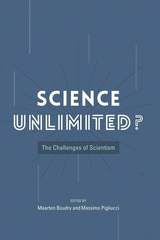
In this wide-ranging collection, contributors ask whether the term scientism in fact (or in belief) captures an interesting and important intellectual stance, and whether it is something that should alarm us. Is scientism a well-developed position about the superiority of science over all other modes of human inquiry? Or is it more a form of excessive confidence, an uncritical attitude of glowing admiration? What, if any, are its dangers? Are fears that science will marginalize the humanities and eradicate the human subject—that it will explain away emotion, free will, consciousness, and the mystery of existence—justified? Does science need to be reined in before it drives out all other disciplines and ways of knowing? Both rigorous and balanced, Science Unlimited? interrogates our use of a term that is now all but ubiquitous in a wide variety of contexts and debates. Bringing together scientists and philosophers, both friends and foes of scientism, it is a conversation long overdue.

The topic of this book is self-consciousness, which is a kind of knowledge, namely knowledge of oneself as oneself, or self-knowledge. Sebastian Rödl's thesis is that self-knowledge is not empirical; it does not spring from sensory affection. Rather, self-knowledge is knowledge from spontaneity; its object and its source are the subject's own activity, in the primary instance its acts of thinking, both theoretical and practical thinking, belief and action.
The chapters of this book cover action and belief, freedom and reason, receptive knowledge and the second person. Each of these topics deserves its own book. And yet they would all be books on self-consciousness, for self-consciousness is the principle of their respective subject matters. Contemporary theories have been badly served by failing to acknowledge this. Taking the full measure of this insight requires a major conceptual reorientation in action theory, the philosophy of mind, and epistemology, which is begun in this book. As it can be said to be the principal thought animating Kant and his Idealist successors that self-consciousness occupies this central position, the book can be read as an attempt to recover and rejuvenate the achievement of the German Idealist tradition.
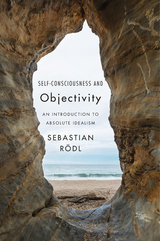
Self-Consciousness and Objectivity undermines a foundational dogma of contemporary philosophy: that knowledge, in order to be objective, must be knowledge of something that is as it is, independent of being known to be so. Sebastian Rödl revives the thought—as ancient as philosophy but largely forgotten today—that knowledge, precisely on account of being objective, is self-knowledge: knowledge knowing itself. Thus he intervenes in a discussion that runs through the work of Bernard Williams, Thomas Nagel, Adrian Moore, and others, who seek to comprehend the claim to objectivity we raise in making judgments. While these authors think that the quest for objectivity demands that we transcend the first person, Rödl argues that it is through the first-person thought contained in every judgment that our judgments possess the objectivity that defines knowledge.
Self-Consciousness and Objectivity can be read as an introduction to absolute idealism, for it dismantles a stubborn obstacle to absolute idealism’s reception: the notion that it is a species of idealism, which is understood to be the assertion that the world depends upon the mind. As Rödl brings out, absolute idealism is the resolute rejection of that idea.
The implications of this work are profound. It undercuts a number of contemporary presumptions, such as that judgment is a propositional attitude, that inference is a mental process, and that there is an empirical science of the capacity for objective knowledge. All of these presumptions flow from the erroneous notion that the objectivity of knowledge stands opposed to its first-person character.
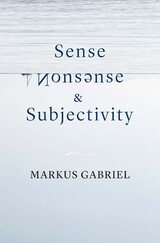
A leading German philosopher offers his most ambitious work yet on the nature of knowledge, arguing that being wrong about things defines the human condition.
For millennia, philosophers have dedicated themselves to advancing understanding of the nature of truth and reality. In the process they have amassed a great deal of epistemological theory—knowledge about knowledge. But negative epistemological phenomena, such as ignorance, falsity, illusion, and delusion, are persistently overlooked. This is surprising given that we all know how fallible humans are.
Sense, Nonsense, and Subjectivity replies with a theory of false thought, demonstrating that being wrong about things is part and parcel of subjectivity itself. For this reason, knowledge can never be secured without our making claims that can always, in principle, be wrong. Even in successful cases, where we get something right and thereby gain knowledge, the possibility of failure lingers with us. Markus Gabriel grounds this argument in a novel account of the relationship between sense, nonsense, and subjectivity—phenomena that hang together in the temporal unfolding of our cognitive lives.
While most philosophers continue to theorize subjectivity in terms of conscious self-representation and the supposedly infallible grip we have on ourselves as thinkers, Sense, Nonsense, and Subjectivity addresses the age-old Platonic challenge to understand situations in which we do not get reality right. Adding a stimulating perspective on epistemic failures to the work of New Realism, Gabriel addresses long-standing ontological questions in an age where the line between the real and the fake is increasingly blurred.

This work seeks to shed light on one of the most enigmatic masterpieces of twentieth-century thought. At the heart of Eli Friedlander's interpretation is the internal relation between the logical and the ethical in the Tractatus, a relation that emerges in the work of drawing the limits of language.
To show how the Tractatus, far from separating the ethical and the logical into distinct domains, instead brings out their essential affinity, Friedlander focuses on Wittgenstein's use of the term "form," particularly his characterization of the form of objects. In this reading, the concept of form points to a threefold distinction in the text among the problematics of facts, objects, and the world. Most important, it provides a key to understanding how Wittgenstein's work opens a perspective on the world through the recognition of the form of objects rather than through the grasping of facts—thus revealing the dimensions of subjectivity involved in having a world, or in assuming that form of experience apart from systematic logic.
Bearing on the question of the divide between analytic and Continental philosophy, this interpretation views Wittgenstein's work as a possible mediation between these two central philosophical traditions of the modern age. It will interest Wittgenstein scholars as well as anyone concerned with twentieth-century philosophy.

Understood broadly as a tacit understanding "shared" by a group, the concept of a practice has a fatal difficulty, Turner argues: there is no plausible mechanism by which a "practice" is transmitted or reproduced. The historical uses of the concept, from Durkheim to Kripke's version of Wittgenstein, provide examples of the contortions that thinkers have been forced into by this problem, and show the ultimate implausibility of the idea.
Turner's conclusion sketches a picture of what happens when we do without the notion of a shared practice, and how this bears on social theory and philosophy. It explains why social theory cannot get beyond the stage of constructing fuzzy analogies, and why the standard constructions of the contemporary philosophical problem of relativism depend upon this defective notion. This first book-length critique of practice theory is sure to stir discussion and controversy in a wide range of fields, from philosophy and science studies to sociology, anthropology, literary studies, and political and legal theory.
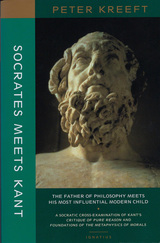
Kreeft’s Socrates reflects what the historical philosopher would likely have made of Kant’s ideas, while also recognizing the greatness, genius, and insightfulness of Kant. The result is a helpful, highly readable, even amusing book. Kant’s philosopher of knowing truly is a “Copernican revolution in philosophy,” as he himself dubbed it. His ethics intended to set out the rational grounds for morality. Did he achieve his goals? What would Socrates say about the matter?
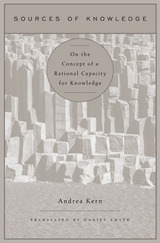
How can human beings, who are liable to error, possess knowledge? The skeptic finds this question impossible to answer. If we can err, then it seems the grounds on which we believe do not rule out that we are wrong. Most contemporary epistemologists agree with the skeptic that we can never believe on grounds that exclude error. Sources of Knowledge moves beyond this predicament by demonstrating that some major problems of contemporary philosophy have their roots in the lack of a metaphysical category that is fundamental to our self-understanding: the category of a rational capacity for knowledge.
Andrea Kern argues that we can disarm skeptical doubt by conceiving knowledge as an act of a rational capacity. This enables us to appreciate human fallibility without falling into skepticism, for it allows us to understand how we can form beliefs about the world on grounds that exclude error. Knowledge is a fundamental capacity of the human mind. Human beings, as such, are knowers. In this way, Sources of Knowledge seeks to understand knowledge from within our self-understanding as knowers. It develops a metaphysics of the human mind as existing through knowledge of itself, which knowledge—as the human being is finite—takes the form of a capacity.
Regaining the concept of a rational capacity for knowledge, Kern makes a powerful and original contribution to philosophy that reinvigorates the tradition of Aristotle and Kant—thinkers whose relevance for contemporary epistemology has yet to be fully appreciated.
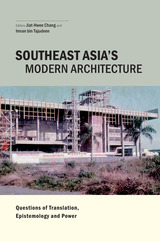
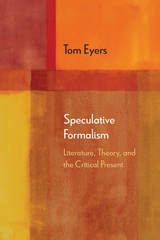
Through a combination of philosophical reflection and close rhetorical readings, Eyers explores the possibilities and limits of deconstructive approaches to the literary, the impact of the “digital humanities” on theory, and the prospects for a formalist approach to “world literature.” The book includes sustained close readings of Baudelaire, Mallarmé, Yeats, and Wallace Stevens, as well as Alain Badiou, Paul de Man, and Fredric Jameson.
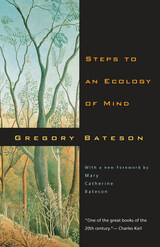
"This collection amounts to a retrospective exhibition of a working life. . . . Bateson has come to this position during a career that carried him not only into anthropology, for which he was first trained, but into psychiatry, genetics, and communication theory. . . . He . . . examines the nature of the mind, seeing it not as a nebulous something, somehow lodged somewhere in the body of each man, but as a network of interactions relating the individual with his society and his species and with the universe at large."—D. W. Harding, New York Review of Books
"[Bateson's] view of the world, of science, of culture, and of man is vast and challenging. His efforts at synthesis are tantalizingly and cryptically suggestive. . . .This is a book we should all read and ponder."—Roger Keesing, American Anthropologist

This study develops a novel account of representational cognition, explaining how cognitive systems progressively come to map the structure of their worlds. Daniel Sacilotto offers a constructive response to the critique of representation formulated throughout the post‑Kantian philosophical tradition. Rather than a skepticism or idealism whereby thinking can grasp appearances but never the real, representation, Sacilotto shows, is a constitutive dimension of cognitive systems’ creative capacity to know and intervene in the world of which they are part.
Structure and Thought: Toward a Materialist Theory of Representational Cognition integrates various lines in contemporary philosophy, including those often seen as incommensurable or in irresolvable tension with one another. Sacilotto thus advances a productive synthesis of a materialist ambition to provide a creative and historical understanding of cognition with a structural realist account of representation. He shows how the different forms of sensory, discursive, and theoretical mediation that characterize human cognition are conducive to a realist epistemological framework that explains how the possibility of knowledge about a mind‑independent reality is conceivable.
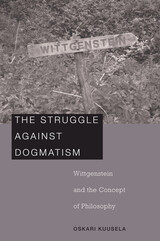
Searching for rigor and a clear grasp of the essential features of their objects of investigation, philosophers are often driven to exaggerations and harmful simplifications. According to Ludwig Wittgenstein’s provocative suggestion, this has to do with confusions relating to the status of philosophical statements. The Struggle against Dogmatism elucidates his view that there are no theses, doctrines, or theories in philosophy. Even when this claim is taken seriously, explanations of what it means are problematic—typically involving a relapse to theses. This book makes Wittgenstein’s philosophical approach comprehensible by presenting it as a response to specific problems relating to the practice of philosophy, in particular the problem of dogmatism.
Although the focus of this book is on Wittgenstein’s later work, Oskari Kuusela also discusses Wittgenstein’s early philosophy as expressed in the Tractatus, as well as the relation between his early and later work. In the light of this account of Wittgenstein’s critique of his early thought, Kuusela is able to render concrete what Wittgenstein means by philosophizing without theses or theories. In his later philosophy, Kuusela argues, Wittgenstein establishes a non-metaphysical (though not anti-metaphysical) approach to philosophy without philosophical hierarchies. This method leads to an increase in the flexibility of philosophical thought without a loss in rigor.

Studies in Metaphysics was first published in 1979. Minnesota Archive Editions uses digital technology to make long-unavailable books once again accessible, and are published unaltered from the original University of Minnesota Press editions.
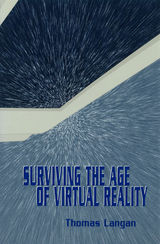
As the technological phenomenon known as the worldwide web permeates civilization, it creates some cultures and destroys others. In this pioneering book, philosopher Thomas Langan explores "virtual reality"Can inherently contradictory phrase"and the effects of technology on our very being. In our present-day high- technology environment, making simple, everyday decisions is difficult because the virtual world we've created doesn't necessarily operate according to the old "common sense." To retain our intellectual fitness, we must, Langan argues, consider these essential questions: If virtual reality is, in fact, reality, what is this life that we are caught up in? What is being within the context of virtual reality? How can we establish a system for distinguishing truth from fiction?
Although technology minimizes distances between people and makes the information they seek more accessible, it simultaneously blurs the line dividing fact from falsehood and real from virtual. An individual's intellectual survival is threatened as technological advancement challenges our collective understanding of what reality is. Because much of the information that is presented as fact simply works to fulfill a specific agenda, we cannot accept as truth everything that appears on the internet or in the media. To survive, we must learn to manage our lives and resources despite the flood of information we are bombarded with daily.
Addressing the general educated reader, Surviving the Age of Virtual Reality expertly interweaves the worlds of technology and philosophy, pushing the analysis of this technological and human phenomenon to new depths.
READERS
Browse our collection.
PUBLISHERS
See BiblioVault's publisher services.
STUDENT SERVICES
Files for college accessibility offices.
UChicago Accessibility Resources
home | accessibility | search | about | contact us
BiblioVault ® 2001 - 2024
The University of Chicago Press









